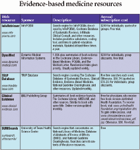Article
The best treatment? It's at your fingertips
Five Web sites for evidence-based medicine make it easy to stay up to date.
Imagine that a woman with carpal tunnel syndrome asks about the best way to relieve her pain. Will splinting work? What about steroid injections?

There's a practical, speedier alternative: You can log on to one of several Web sites that have already catalogued, summarized, and evaluated the research you need. If you did that for the woman with carpal tunnel syndrome, you'd find solid support for steroid use, but not so much for splinting. And you'd discover this in a few minutes while the patient's in the exam room, says FP Eamon Armstrong of Flagstaff, AZ, an advocate of evidence-based medicine who has taught it to residents.
Web sites such as DynaMed ( http://www.dynamicmedical.com), InfoRetriever ( http://www.infopoems.com), SUMSearch (sumsearch.uthscsa.edu), Clinical Evidence ( http://www.clinicalevidence.com), and TRIP Database ( http://www.tripdatabase.com) are designed to put evidence-based medicine at your fingertips. These resources have enormous implications for patient care. Every year, MEDLINE grows by more than half a million references. It's daunting for any physician to keep up with the research in his specialty, much less pinpoint what's really beneficial to his patients in terms of outcomes that matter to them, such as mortality, morbidity, and quality of life. Some clinicians have dubbed such essential studies POEMS, or "patient-oriented evidence that matters."
"A study may report that a drug lowers blood pressure or cholesterol, but does the drug actually decrease the risk of heart attack?" says Armstrong. "Articles that qualify as POEMs account for only 2 percent of the literature, and it's hard to find them in the haystack."
Pile on time constraints, and the search for relevant information gets even more frustrating. Family physicians, for instance, find themselves asking about eight clinical questions a day but immediately pursue only about one-third, according to a 1999 study. "Time is a major obstacle that prevents physicians from efficiently finding answers to their questions," notes Armstrong. It's all the more reason, he says, for busy doctors to have easy access to good information, particularly at the point of care.
How Web tools track down the best evidence Web sites for evidence-based medicine amass research from a variety of respected sources and are updated frequently, making them more current than textbooks. A cornerstone for all but SUMSearch is The Cochrane Library ( http://www.cochrane.org/reviews/clibintro.htm), a collection of evidence-based medicine databases. The library is produced by The Cochrane Collaboration, a nonprofit, international healthcare organization headquartered in the UK.
You can conduct a Google-style search at each of these Web sites, although material at DynaMed and Clinical Evidence also is indexed for browsing. SUMSearch lets you fine-tune a search, say, on diabetes, by picking a filter such as "physical findings," "prognosis," or "intervention."





